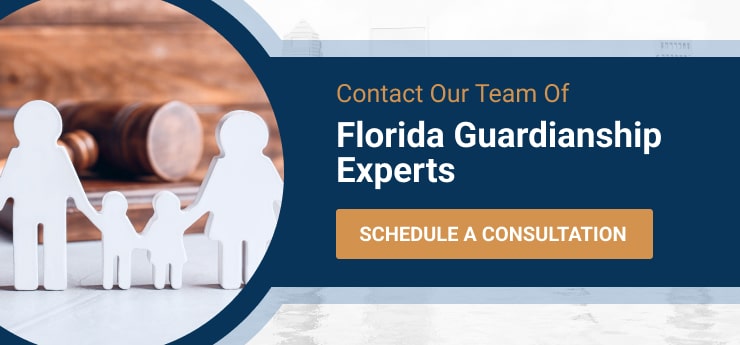Guardianship Attorney in Stuart
The Law Offices of Travis R. Walker, P.A. provides legal counsel to Martin and Palm Beach County residents on complex guardianship matters. There are some situations that arise where legal guardianship is required. When minors or illness, age-related decline, or unexpected tragedy renders a person incapable of making sound financial decisions or caring for themselves, a court-appointed guardianship can protect their interests.
Our Guardianship
Attorneys

Guardianship ensures vulnerable individuals receive legal protection of their personal well-being and finances. It is a legal process that applies to incompetent adults who cannot make legal decisions and minors who cannot be raised by their parents due to death, incarceration, legal order, or other extenuating circumstances.
Guardianship Attorney Stuart, FL Residents Trust
Regardless of the case, navigating the legal system in this area does have its challenges. However, by working with an experienced attorney, you can ensure that you are able to establish the appropriate type of guardianship under Florida law.
The decision to seek a guardianship over another person can be life-changing. With compassion, empathy, and honesty, we support clients through every aspect of this process, ensuring they have the knowledge and resources to prepare for this important role.
For effective representation in Florida guardianship issues, reach out to a family law attorney at our firm who can assist with:
- Preparing guardianship petitions
- Filing for an emergency temporary guardianship
- Appointing guardianship
- Establishing incapacity
- Competency hearings
- Guardianship litigation
- Guardianship removal
Types of Guardianships in Florida
A guardianship lawyer in Stuart, FL can provide assistance in Florida’s three types of guardianships: adult, minor, and limited guardianships.
Adult Guardianship
Adult guardianships are appointed by the Court as a sole decision-maker for an adult who is unable to make decisions for themselves. One context in which this happens is when an adult child steps in as a guardian for their parent, who has become incapacitated. The guardian of an adult can have guardianship over property or guardianship of the person, or in many cases, both. The guardian of the property has power to control the assets of the ward, such as real estate, stocks, bank accounts and bill payments. In this role, the guardian must ensure that all assets are appropriately managed for the ward’s benefit. The guardian may also make critical health-care and basic living decisions for an adult who has been deemed incompetent by the law or mental health professionals.
Minor Guardianship
Minor guardianships occur when the biological parents are either deceased, incapacitated, or are unable to properly parent a child. For example, if parents are deemed as “unfit” due to drug or substance abuse issues, or they are cognitively impaired, a legal guardian would be preferable for the minor’s well-being. In these cases, the Court selects a legal guardian to make decisions regarding the child’s education, health, residence, and other essentials. Florida law stipulates that if a minor inherits $15,000 or more, they must be appointed a guardian of property.
Limited and Plenary Guardianship
Limited guardianships are appropriate if the Court finds that the adult in question lacks the ability to perform some — but not all — of the tasks necessary to care for his or her person, property, or finances. For instance, in a limited guardianship, the ward may retain the right to decide where they live, but their guardian may not have control over whom they wed. By contrast, a plenary guardian exercises all legal rights and powers of the ward.
Who Is Eligible to Be a Guardian in Florida?
The legal authority and general provisions for guardianship in Florida are outlined in Chapter 744 of the Florida Statutes.
In Florida, the eligibility requirements to be a legal guardian of a resident ward include:
- A Florida resident who is 18 years or older, AND
- Has no felony convictions
- Is qualified to act as guardian of the ward
A nonresident of Florida may serve as guardian if he or she is:
- Related by lineal consanguinity to the ward
- A legally adopted child or adoptive parent of the ward
- A spouse, brother, sister, uncle, aunt, niece, or nephew of the ward, or someone with a blood relationship to any such person
- Has no felony convictions
Termination of Guardianship Administration
Only temporary guardianships expire within a certain period of time. To end the guardianship of an adult, the ward must file a “Petition to Terminate Guardianship” with the court and prove that they possess the skills and capacity to care for themselves and make sound decisions. A guardianship of a minor terminates on the minor’s 18th birthday.
Resignation of the Guardian in Florida
There are many reasons why a guardian may decide to resign from their position. This is a judicial process that can benefit from skilled legal counsel.
For a guardian in Florida to resign, they must submit:
- a final report of his or her guardianship
- proof of the termination of the ward’s incapacitation
- proof of their inability to locate the ward (when applicable)
- all records and documents regarding the ward’s property
- copies of the ward’s health care records
How The Law Offices of Travis R. Walker, P.A. Can Help
Florida law requires guardians to have legal counsel. If you have questions about guardianship or are ready to get started, please contact the legal team at The Law Offices of Travis R. Walker, P.A. today. We can also explore any related family or probate matters that may impact how the process will unfold. Our Stuart-based guardianship lawyers look forward to helping you any way we can.
Your Three Steps to Moving Forward
Call our office or complete our contact form and set up an intake call with our Intake Coordinator.
Attend a virtual or in-office consultation so we can better understand your case and determine how we can help guide you to success.
Retain our firm so we may lead you through the legal process as quickly and painlessly as possible.
Currently Accepting New Clients
Guardianship Related Pages
Our Office
Port St. Lucie OFFICE
-
10026 S U.S. Hwy 1
Port St. Lucie, FL 34952 - 772-325-1860
- 772-673-3738
Client Testimonials
Simply enter your email below and join our growing community of informed individuals.









